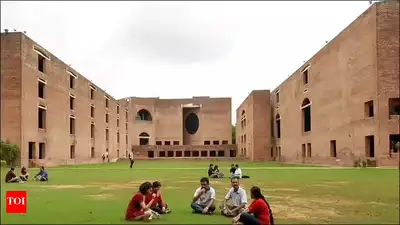ARTICLE AD BOX

MUMBAI: On Friday evening, the Indian Institute of Management Ahmedabad (IIMA) did more than cut a ribbon—it deepened a tradition. With the inauguration of the Madan Mohanka Centre of Excellence in Case Method of Learning, the Institute renewed its commitment to a pedagogy that has defined it since inception: learning not by rote, but by wrestling with dilemmas drawn from real boardrooms and factory floors.The launch at the JSW auditorium brought together the who’s who of academia, policy, and industry. Vineet Joshi, Secretary in the Ministry of Education, was chief guest; Harvard Business School Dean Srikant Datar joined in virtually; and IIMA’s own leadership—including Director Bharat Bhasker, Chairperson of the Board Pankaj Patel, and faculty spearhead Saral Mukherjee—lined the dais. But the day truly belonged to Madan Mohanka, alumnus of the 1967 batch and Chairman of Tega Industries, whose endowment made the Centre possible.A pedagogy that asks more than it answers
IIMA has long prized the case method. Unlike lecture halls where knowledge trickles from podium to notebook, the case room is noisy, urgent, and unresolved. Students are given messy, real-world situations—an oil company entering a volatile market, a start-up facing cash-flow crises—and must assume the role of decision-makers. Every raised hand offers a different view; the faculty member is less oracle, more conductor of a symphony of competing voices.
“It teaches you how to think, not what to think,” said Joshi, congratulating the Institute. In an era where uncertainty is the only certainty, he argued, India needs leaders who can navigate ambiguity with confidence. “We must nurture job creators, not just job seekers,” he added, framing the pedagogy as nation-building.Harvard’s echo, Ahmedabad’s voiceFor Srikant Datar, the connection was personal. “The case method shaped my own career,” he said from Boston.
Even in the age of AI and large language models, he insisted, it remains vital. “It keeps faculty close to practice and keeps students engaged long after the classroom ends.” The new Centre, he predicted, would strengthen IIMA’s voice globally in how management is taught.For Mohanka, the Centre was both homage and ambition. He recalled his teachers, Professors Kulkarni and Mote, who brought the method from Harvard to Ahmedabad six decades ago.
“This is not merely the birth of a Centre,” he said. “It is the beginning of a movement—in how Bharat thinks, teaches, and learns.”From classroom to countryThe Centre’s mandate is expansive: fund and edit new cases, train faculty across India, host workshops and conferences, and encourage doctoral students to experiment with case pedagogy. It aspires to be both think-tank and training ground, ensuring that business education here reflects the complexity of business outside.Board chair Pankaj Patel reminded the audience that philanthropy has always underwritten IIMA’s growth—from the ₹9 lakh pooled by citizens at its founding, to today’s alumni-led Endowment Fund that enabled this gift. Director Bhasker underlined how the Centre would position IIMA not just as a beneficiary of the case method, but as its innovator in India.A day before the inauguration, the new Centre had already hosted a conference, “Case Method in 2025: Taking Stock and Moving Forward,” drawing faculty from across the country for a roundtable on the future of case teaching.A legacy renewedFor an institution that has long seen itself as India’s management crucible, the new Centre is a signal of continuity and reinvention. It honours the guru-shishya parampara Mohanka invoked, while equipping a new generation to learn through argument, analysis, and ambiguity.The case method, after all, is not about the case at hand. It is about preparing minds to frame the next one.



.png)
.png)
.png)
















 1 hour ago
2
1 hour ago
2









 English (US) ·
English (US) ·